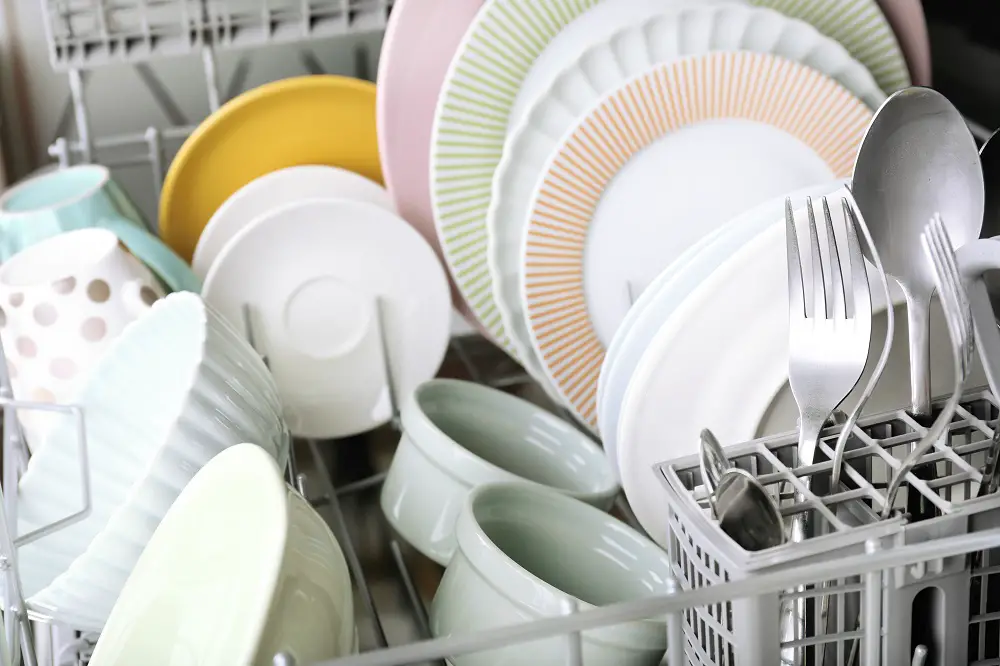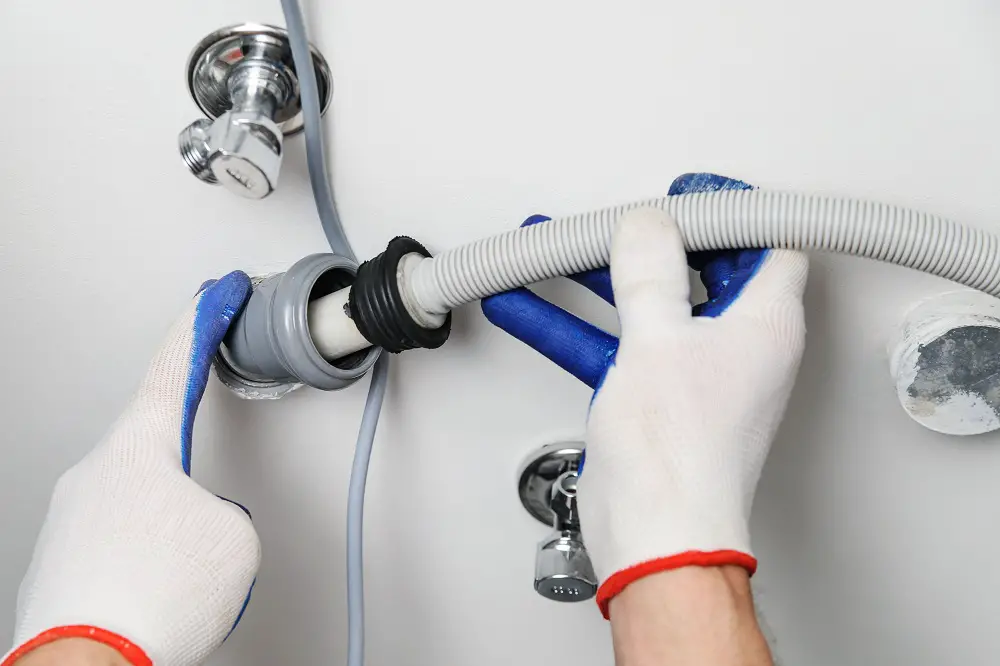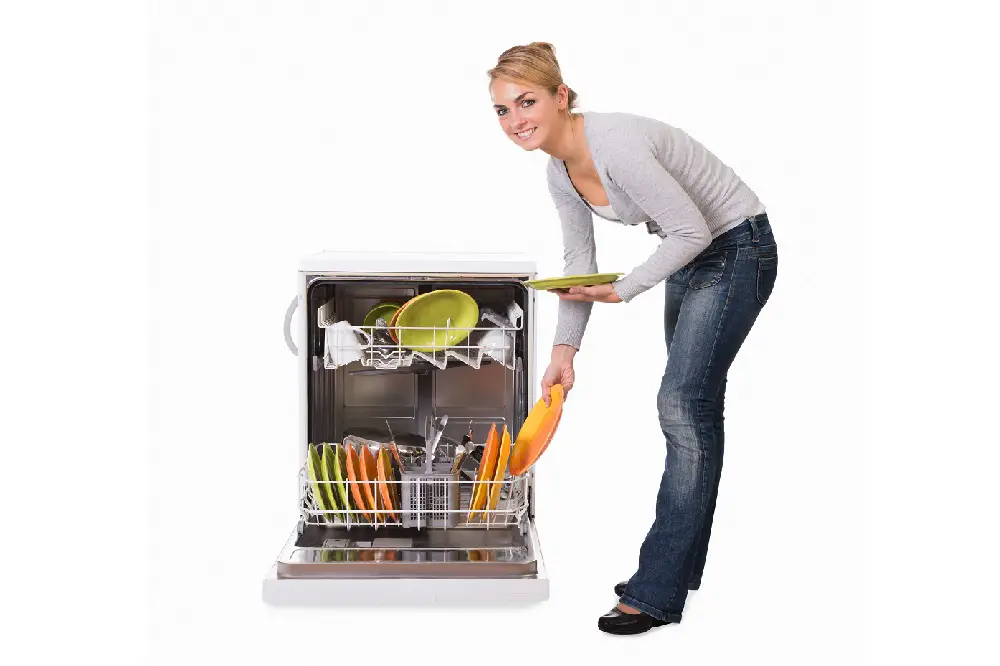Countertop dishwashers have become increasingly popular owing to their convenience and space-saving features. While all dishwashers generally use much less water than hand-washing, there’s the question, ‘Do countertop dishwashers save water?’
Generally, most countertop dishwashers are designed to use about 3-4 gallons (11-15 liters) of water for a wash cycle. Although, some models may use even lesser. Countertops use much less water than handwashing or even built-in or freestanding models.

Let’s look into the actual water consumption of countertop dishwashers, the related water costs, and how you can reduce water usage.
Table of Contents
Actual Water Consumption
Since countertop dishwashers are smaller than built-in or freestanding models and have a reduced capacity, they use comparatively less water.
Here’s more information on the actual water usage of countertop dishwashers, regular models, and handwashing. This will help us understand how much water countertop dishwashers save.
Countertop Dishwashers
Based on how water is supplied to the dishwasher, there are two types of countertop dishwashers:
- Models that use the regular water inlet hose connection
- Models that have a fixed-capacity built-in water tank (and may also have the option to connect with a water inlet hose)
The following table shows the water usage of a few different countertop models:
| Program | Danby 24” | Magic Chef 21” | Danby 18” |
|---|---|---|---|
| Normal | 10.8 | 10.8 | 10.8 |
| Heavy | 14.5 | 12.5 | 12.5 |
| Light | 12 | 10 | 10 |
| Speed | 12 | 10.5 | 10.5 |
| Glass | 7 | 8.5 | 8.5 |
| Rinse | 5 | 4.3 | 4.3 |
As is evident from the table, water usage depends on the capacity of the countertop dishwasher and the wash cycle. Models with a larger capacity will require more water for most cycles to effectively clean a load of dishes.
The average water usage of countertop dishwashers for a normal wash cycle is 2.85 gallons (10.8L). Moreover, specific wash cycle settings like Eco mode further reduce water consumption in some models.
Regular Dishwashers
To understand how much water countertop dishwashers save, it would help to know how much water regular dishwashers use.
Here are the actual numbers of water usage by different models of regular dishwashers:
| Cycle | Samsung 18” | Bosch 24” | Samsung 24” |
|---|---|---|---|
| Auto | 9 – 17.7 | 12.9 – 24.1 | 18.4 – 31.9 |
| Normal | 9 – 17.7 | 8.8 – 21 | 11.7 – 27.2 |
| Heavy | 17.7 | 18.6 – 24.2 | 33.1 |
| Light | 15.9 | 9 – 14.6 | 19 |
| Speed | 12.8 | 14.3 | 14.3 |
This table clearly shows that the water usage of built-in models is much more than countertop dishwasher models.
The average water usage of built-in dishwashers for a normal wash cycle is 5 gallons (19 L), almost twice that of countertop dishwashers.
As seen with countertop appliances, water usage of built-in dishwashers also depend on the capacity of the machine and the choice of the wash cycle.
Handwashing
Usually, the water usage for handwashing dishes varies on factors like the number of dishes being washed, the efficiency of the person washing, and the flow of water from the faucet.
Washing a typical load of dishes involves pre-rinsing, washing, and rinsing.
The general water usage in handwashing ranges between 20 – 27 gallons. That’s at least four times more than the average water usage of built-in dishwashers and nine times more than countertop dishwashers.
Federal standards mandate the average flow rate of a kitchen faucet should be no more than 2.2 gallons per minute. Considering traditional handwashing with the tap running continuously for even ten minutes, the water usage will be about 22 gallons.
For greasy or heavily soiled dishes, more water may be required to clean them thoroughly. Washing such dishes often involves a pre-soak or pre-rinse and extra water for thorough cleaning.
A load of handwashing is often a mix of dishes, cutlery, glasses, cups, pots, pans, and even heavily soiled items. If the average time spent washing dishes ranges between 30 minutes to an hour in a day, consider the tap running for about 15 – 30 minutes. The corresponding water usage ranges between 33 – 66 gallons.
Whichever way you see it, there’s no doubt that handwashing uses a considerable amount of water compared to any dishwasher.
Do Countertop Dishwashers Save Water?
From the water usage statistics of countertop dishwashers vs. regular models or even handwashing, it’s evident that countertop appliances save a lot of water.
However, we must also consider the smaller size of these dishwashers, resulting in a reduced capacity. That leads to the following two questions:
- Is the water usage per cycle of countertop dishwashers better?
Yes, the average water usage per normal cycle of countertop dishwashers is 2.85 gallons. This is much better than the average of 5 gallons used by built-in models and about 20 – 27 gallons used for handwashing.
- Is the water usage per x dishes better?
Now, here’s where countertop dishwashers lag.
The average number of dishes you can fit in a countertop dishwasher is about 30 (silverware isn’t included in this count). These include plates, cups, glasses, and bowls. However, you cannot load pots and pans into these appliances.
So, that’s an average of 2.85 gallons of water for 30 items in countertop dishwashers.
On the other hand, built-in dishwashers can hold anywhere between 100-160 items, including pots and pans. Let’s consider an average of 130 items in built-in dishwashers.
That gives an average of 5 gallons of water for 130 items in built-in dishwashers.
If you were to wash 130 items in a countertop dishwasher, it would take about four cycles, which is about 11.4 gallons of water – more than how much a built-in dishwasher uses for a single cycle.
As for pots, pans, and larger dishes, you’ll have to handwash them since they can’t fit in a countertop appliance.
Hence, the resulting water usage per x dishes is worse for countertops than built-in models.
What Are The Water Costs For Countertop Dishwashers?
Now that you’ve seen how countertop dishwashers are an excellent water-saving option for small loads, let’s consider the associated water costs.
For an average cost of $0.0015 per gallon of water, here’s how much the different wash cycles will cost:
| Program | Water Charges/Use | Water Charges/Year |
|---|---|---|
| Heavy | $0.0052 | $1.9 |
| Normal | $0.0043 | $1.57 |
| Light | $0.0042 | $1.53 |
| Glass | $0.0032 | $1.17 |
| Speed | $0.0044 | $1.61 |
| Rinse | $0.0018 | $0.66 |
As you can see the water costs, even when using the dishwasher daily, is incredibly low. If you are just concerned about water usage because you want to save some bucks – it isn’t worth it.
How To Reduce The Water Consumption?
While countertop dishwashers consume less water as it is, some valuable tips can help reduce water usage further:
- Efficient Loading
Load your countertop dishwasher efficiently; refer to the manufacturer’s guide to know how to do this. However, avoid overloading, as this may result in improper cleaning and the need to run an additional wash cycle.
- Run Full Loads
Wait until you accumulate a full load of dishes before you run a wash cycle. Running partial loads causes wastage of water and energy. If you don’t have enough dishes for a full load, consider handwashing instead.
- Scrape Off Excess Food
Ensure you scrape off any large food particles or scraps from the dishes before loading them. Avoid pre-rinsing as much as possible since it will increase water usage. Moreover, modern dishwashers are designed to clean even the toughest of stains effectively.
- Use the Appropriate Wash Cycle
You’ll find multiple wash cycle options in most countertop dishwashers. It’s essential to choose the appropriate cycle based on the load of dishes and how soiled they are.
- Repair any Leaks
Regularly inspect your dishwasher for any drips or leaks. These can lead to significant water wastage over time. If you notice even a tiny leak, it’s best to address it immediately to minimize water loss.
- Use the Dishwasher’s Water-Saving Features
If your countertop dishwasher has water-saving features like half-load or eco-mode, consider using that whenever possible. These settings are designed to reduce water consumption and will help conserve water.
Conclusion
The comparison of water usage of countertop appliances with built-in models and handwashing clearly shows that countertop dishwashers do save water per cycle.
However, owing to their reduced capacity, it’s an ideal choice if you want to wash only a few dishes.
With a few useful tips like efficient loading, running full loads, and scraping off excess food, you can further reduce the water consumption of dishwashers.




Got one of these countertop dishwashers last month and it’s been a game-changer. The lower water usage is real, plus it fits perfectly in my tiny kitchen. Was surprised by how much it can actually handle despite its size.
I’ve been trying to cut down on water use and this article nailed it with countertop dishwashers. Would have never thought about this option otherwise. Thanks for the info, Martin!
Yo, anyone know if these fit in super small spaces? Trying to figure out if it’s worth ditching hand washing for my cramped setup.
Everyone should consider switching to these countertop models. It’s such a smart move for the planet. Compact and efficient, plus you save a ton on water bills!
Between work and the kids, I’m all for anything that makes life easier. Got a countertop dishwasher and it’s been a lifesaver. Quick cycles and clean dishes with less mess.
Nice roundup on the benefits of countertop dishwashers. However, it would be helpful to include more on the different models available and their specific water consumption rates for better comparison.
Wondering how the water bill stacks up with these compared to regular ones. Anyone got the numbers on that?
Based on what I read, they use much less water, so you’re looking at noticeable savings over time. Definitely worth the switch!
Don’t forget, installation’s a breeze. You save on water and no need for expensive setup costs!
For those considering a countertop dishwasher, remember to look at energy ratings as well as water usage. Efficiency is key in both aspects for maximum environmental benefit.
Always washed dishes by hand, believing it to be the most thorough. These newfangled devices claim to save water, but do they clean just as well? Hard to believe anything can match the human touch.
Countertop dishwashers sound like a cool tech addition to any kitchen. Curious about the specific models out there and their features. Any recommendations for a tech enthusiast looking to upgrade?